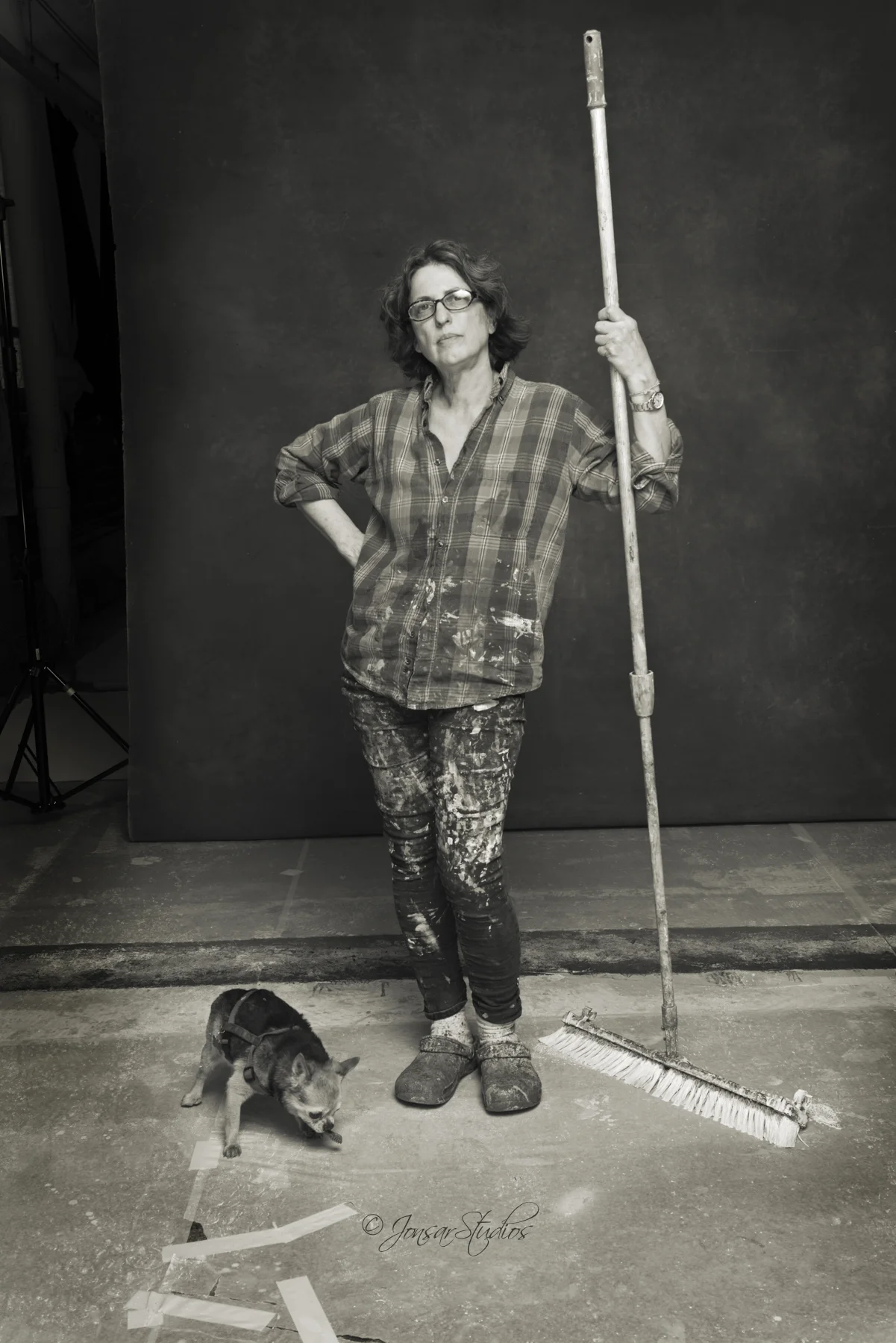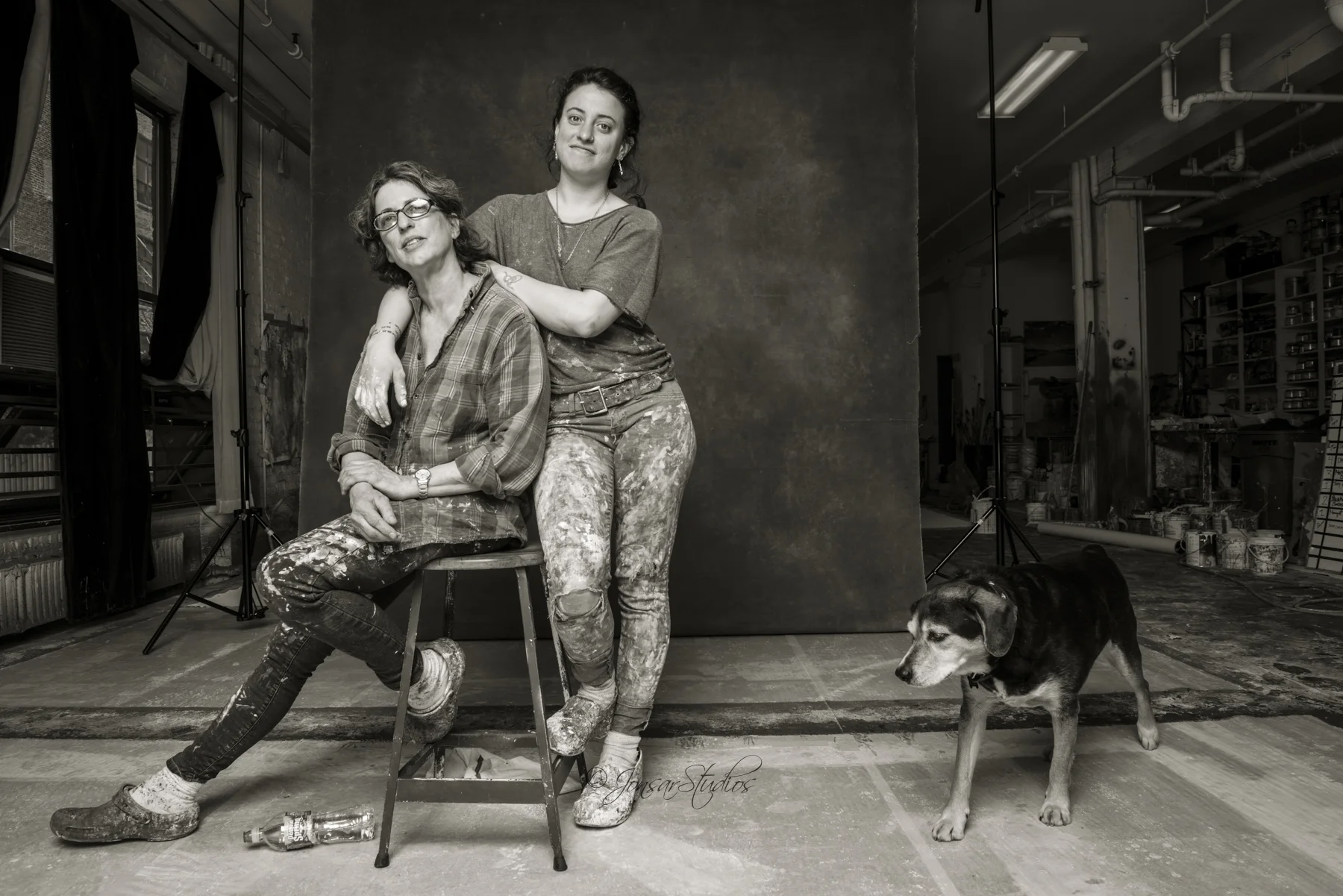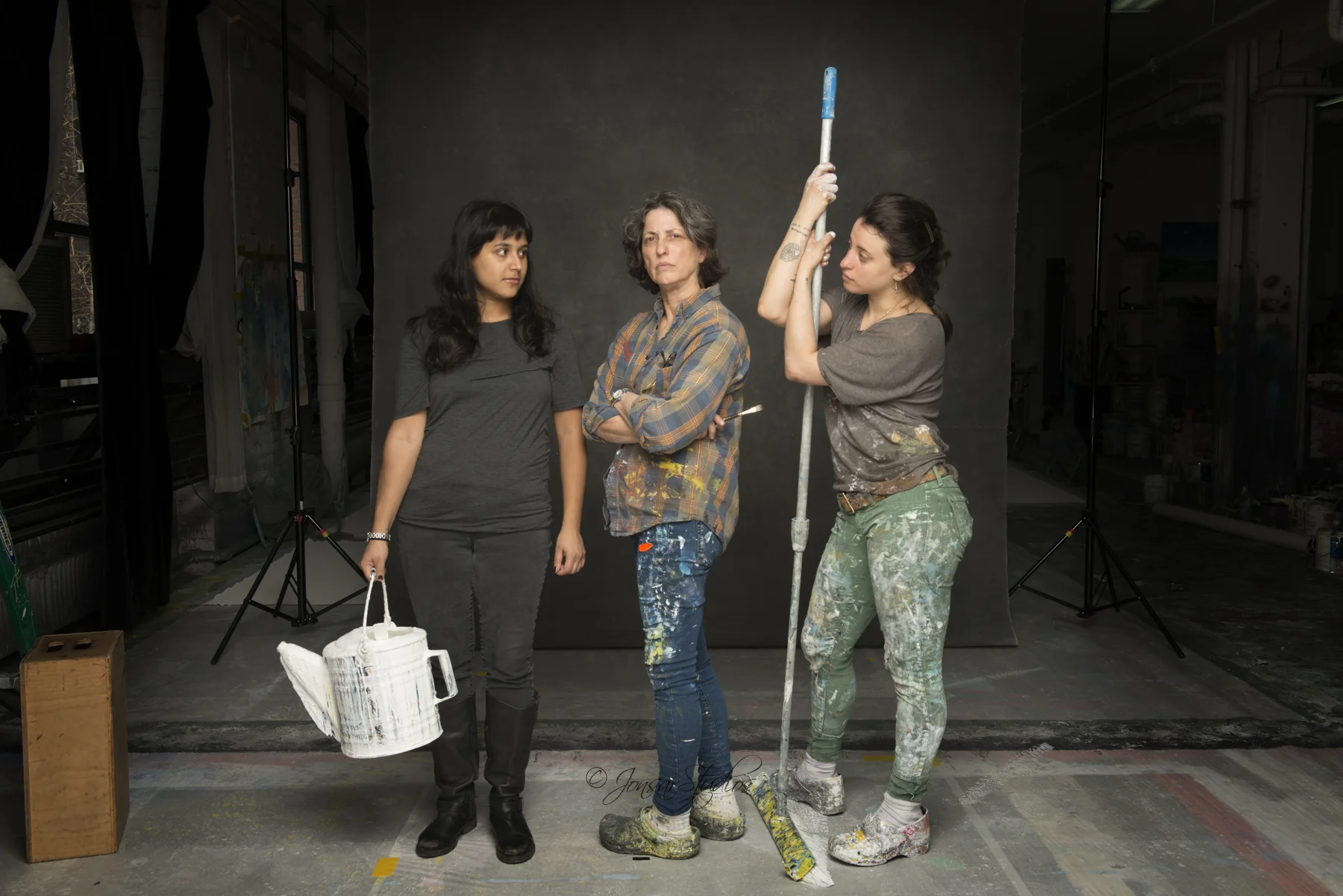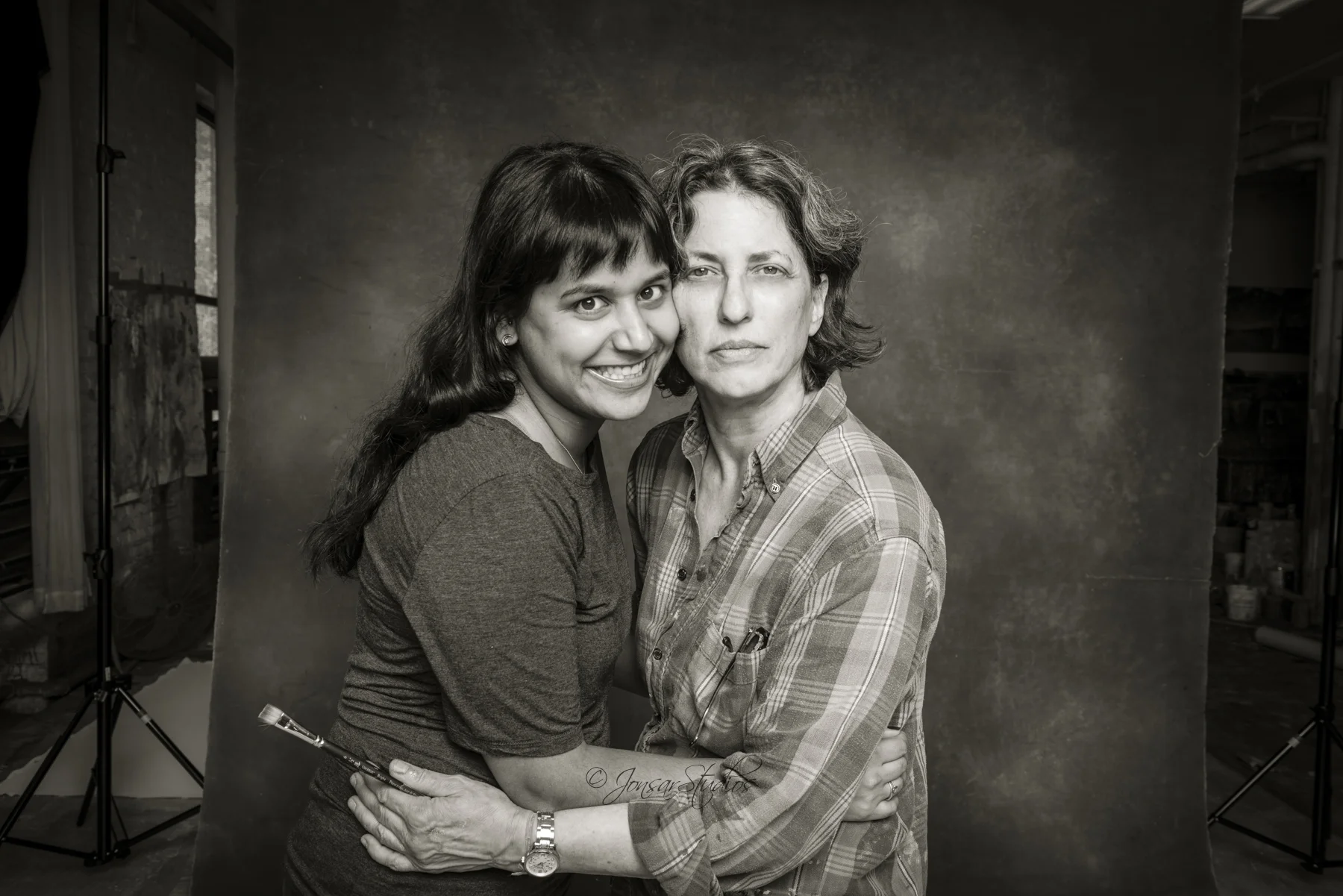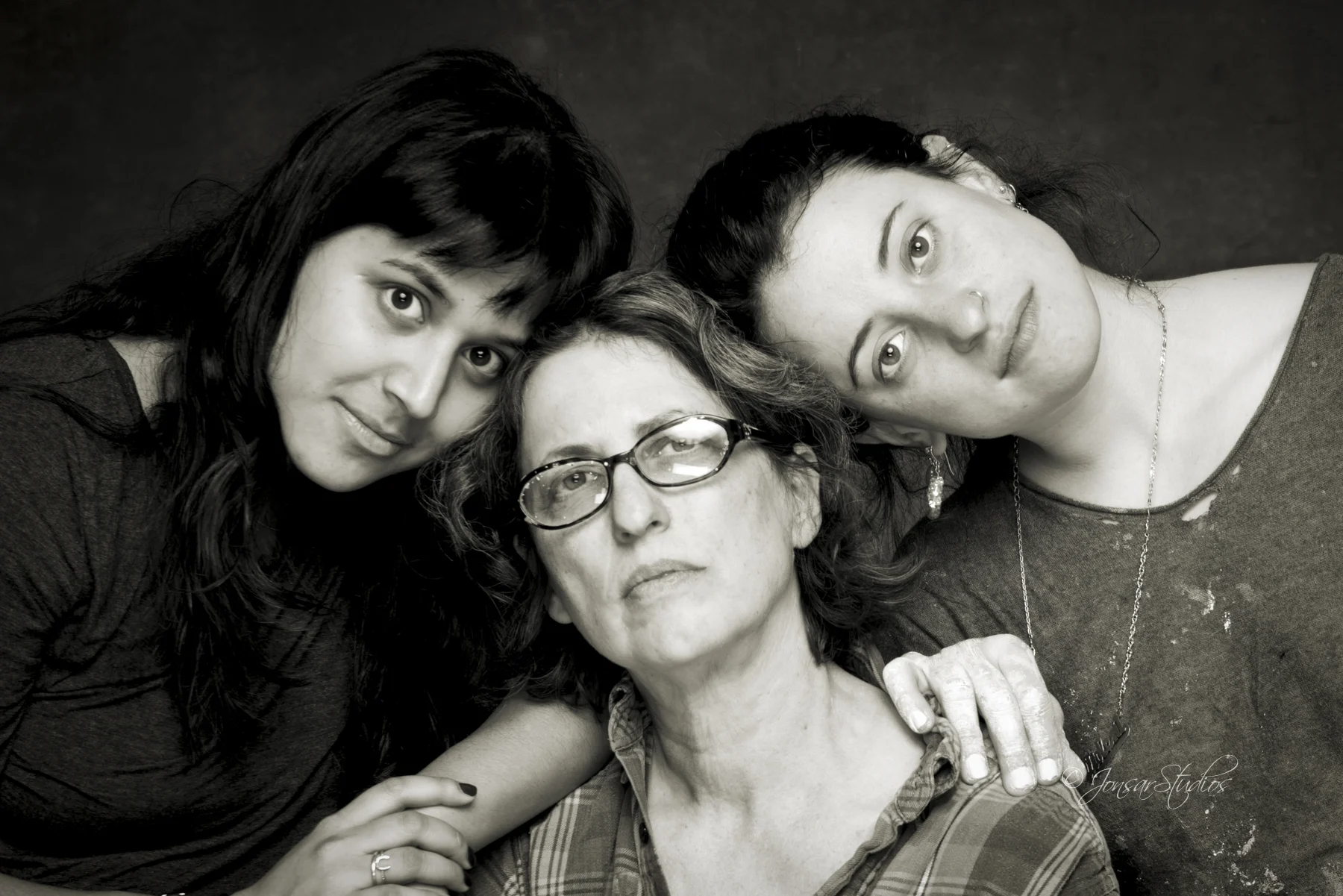Sarah Oliphant - Conversations with Artists
"I started this business a million years ago. I was starving -- working as a scenic artist in the theatre (not really starving because my family wouldn’t let me starve) but I was making 100 dollars a week and that was back in the day. My apartment on Avenue A and 9th Street was 100 dollars a month. It was a totally different world. You could come to NY - and you could survive back then. I only made 5 dollars an hour, but you could be an artist and survive in New York. Now you’ve got to live in Bed Sty with 11 roommates — it’s ridiculous. And in Bed Sty, one bedroom is $2000. It’s crazy. NY is ruined. When I moved to Bushwick I thought 'there goes the neighborhood' Because I’m the establishment."
Why did you move to NY?
"It was because of my boyfriend at the time -- who was my college professor. This was back in the day when you HAD to sleep with your college professor — it was like a requirement. I got my BA - took me forever to get my BA in art. I just wasn't suited for being an “artist.” I don’t have that mentality. I don’t have enough ego. I love collaborating. I didn’t want to finish college because you graduate and have to get a job. So I went to graduate school for theatre, and I learned everything in the theatre. I knew I wanted to work in the theatre but I didn’t know exactly how. I just knew that my particular talent - whatever it is - was better suited in the theatre. I just found the whole 'artist thing' to be such bullshit, and so tiring to me. 'Oh these are my paintings' and blah blah blah."
Don’t you consider yourself an artist?
"I consider myself a master craftsperson."
What’s the difference?
"It’s not so much about the self. It’s more about the 'thing.' Not that I don’t think that my work is valuable, it’s super important to me. I’m a workaholic. I will do your project or whatever it is, I will work on it day after day after day until I know it’s the best that I can do. Or my projects - but it’s the 'thing' that's more valuable to me than the ego. I’m sure it’s some fucked up part of my personality, but I like collaborating. I work better as a collaborator."
Was there something in your childhood that led you there?
"I was identified as an artist when I was four years old, but I wanted to be a mountain climber or an airline stewardess. I thought that would be so awesome. We had gullies behind our house — I was a master gully climber. But I was identified as an artist - my particular talent is a kind of hand-eye coordination. I had it much better when I was younger. An ability to copy -- I could look at something and copy any size from anything. It probably was a weird form of brain damage. You know how that thing happens when you have a deficit in one area and you make up for it in another area. So that was startling in my kind of family - an upper-middle-class Southern family-- there were no artists in our family at all."
Were you encouraged?
"Oh yeah. I was given art lessons. I was fortunate in the early fifties in a tiny little cotton mill town in South Carolina to have a mother that encouraged me … because I was just different. I didn’t want to be different. I wasn’t striking out to be different — I don't have enough of that “me” thing. I just was different. My mother would say “oh Sarah can’t do her homework - she’s an artist. Sarah can’t make her bed up, she’s an artist. Sarah’s not concentrating, she’s an artist.” So instead of being lazy or bad or all the things I could’ve been, I wasn’t — I was an artist. I remember thinking: 'fuck! I’m an artist. What about my mountain climbing career?' So I took art lessons from one of our neighbors -- one day a week from the time I was in the 2nd grade until I graduated from high school. Whether I wanted to or not, it was like going to church. I had to go to art class. Sometimes I was her only student. It was just a thing I had to do.
I had that particular talent. Which is not something you would wish upon somebody who wanted to be an artist because it inhibits you. I was raised to artistically perform for praise. I learned how to have somebody go ”oh my god, you just drew that?” I don’t think it necessarily works to your advantage."
Did you feel it was a burden?
"Not a burden. There were rewards. I was known for it. I knew that for my town it was special. But I felt it was limiting. I’m certainly not sorry that I had this talent because it’s given me enormous joy. Enormous joy. The worst thing about it is I am a workaholic. In the classic sense of the word, where it’s not really a good thing. It becomes limiting where it’s all I really want to do. Would it have been different if I hadn’t started so young? It’s certainly turned into the luck of the way it all went down. I found a way to collaborate on both a small scale — in that I’m pretty small potatoes — but also on a large scale. Our backdrops have probably been seen - if you were to call them art — they’ve been seen more than any other art in the world because they’ve been seen in so many publications and so many photographs in so many of thousands and thousands and thousands of them and over and over and over. I’m not saying that this makes me so great, I don’t want to sound like an asshole. But I realized one day that if you just glance at a newsstand you see every single month Oliphant after Oliphant after Oliphant. Only because it’s the texture behind Annie Leibovitz on Vanity Fair or Newsweek."
When do you feel the most joy?
"I feel the most joy on a Friday night because I know that the next day is Saturday and the day after that is Sunday and I get to come to my studio and generally I have it all to myself. I get to work all day long by myself. Even if it’s a horrible job. I feel enormous joy knowing: YES it’s the weekend, I get to be here and no one is going to come up to me with questions or worries. I let the women in the office do everything, they’re super important. But on the weekends it’s just me and the studio and it’s uncomplicated."
Describe that feeling when you walk into the studio.
"It's that horrible expression — I know it’s so trite — the “zone” but it’s true. You just sort of vanish - it’s like a journey. I like long distance walking. I love being in a place that I’ve never been with vistas that I’ve never seen. Even if you’re tired and your boots don’t fit. That’s sort of what it’s like when you’re painting. But you have to work for that feeling. Occasionally I get that kind of 'fuck, I have to do all these paintings for all these photographers and they want them to look just like this or just like that…'
I realize that I get very limited when I get super specific directions. We work all different kinds of ways for people. Well-known photographers will either rent something or ask me to paint something. They will give me direction - sometimes photographic. But there’s an ease to it. I’ve been doing this for a long time. I work really hard and do the best I can. It’s these personal photographers, some of them really sacrifice to have this backdrop. And it’s such a burden of responsibility. I’m working really hard to go outside of that. I get too trapped by trying to copy their references. So now I’m working to make each time I paint a backdrop like it’s the very first time. I can’t try to make it look exactly like another backdrop because that will screw me up faster than anything. The most successful backdrops have to stay backdrops. Because the drop is not the 'IT.' It’s the 'behind the IT.' And that’s what I try to teach to Violet. The backdrop should only be noticed by the photographer and the photographer’s friends who are jealous like 'where’d you get that?!' That’s how I know I’m successful. When your friends come and say; 'where did you get that?' Then I’m like 'yes!' But the client? They don’t notice."
What inspires you?
Collaboration equals inspiration. For instance, Annie Liebovitz, probably the most famous photographer of the present, is probably somebody who also gives enormous freedom. She’ll give vague references. She’ll say 'paint it on anything.' She wants it to look old and dirty. So I painted on an old piece of canvas. Because she’s who she is, she inspires a certain level of 'just go for it.’ So I poured paint on the back of an old piece of canvas, and it’s turned into the drop that she’s used 100 thousand times. That little drop that you see in everyone of her pictures was painted on something we were going to throw away. But it has the sense of such freedom that now I paint a lot of drops that way. It was a discovery. It turned out like a watercolor. That was my discovery and it’s made so many great backdrops, all because Annie Leibovitz said “just go for it.”
"People think I must be really nervous when I paint a drop for Leibovitz. But it’s the exact opposite. I’m more nervous when I have to paint a drop for some 26 year-old from Des Moines who’s saved all his money for me to paint his backdrop so he can look like Leibovitz. I lay in bed at night worrying. I’m sweating the whole time I’m doing it. Or I do it a million times. But with Leibovitz I think, 'Oh let me just throw a gallon of paint on it and some water' and sometimes it looks amazing.
I just talked to a photographer in Sweden. I asked him if he wanted to give me Pantone colors, and he said 'No, let’s just talk about the color.' He was talking about bleached plywood and creamy grays. I asked him: 'ok, do you want to send me colors, or do you want me to go just from these descriptives?' He said 'oh, it’ll just be more beautiful if you give me YOUR interpretation of creamy gray.' I was like 'YES!' It will definitely be more beautiful if I use my interpretation of creamy gray -- because if he sends me pictures and numbers, I can feel it getting tighter and tighter and tighter. But I don’t want people to think if they send me references I’m not going to get it. I’m still going to get it. But I’ll have more fun and I’ll have less angst if I have a little freedom."
If you could go back and whisper advice in your own ear when you were a child what would you tell yourself?
"I wish someone had told me it doesn’t really matter what anyone else thinks about you, because you’ll never really know. What I think is what matters. You can’t really know what someone else thinks, you can’t even know what your own children think. You can’t know what the person next to you thinks. We are taught to compare ourselves to each other. To compare our children to other peoples' children. 'How’s little Rachel doing?' 'Oh, she's in Harvard med school.' And I think: 'wow my kid’s in recovery.' But I wouldn’t trade her for anybody. Look at her - she's phenomenal.
So I'd tell myself to stop thinking that what somebody else has is so much better. Because it’s all f’n spin anyway. Particularly with Social Media. You’ll never know what people are really feeling. It’s all spin. Stay the course and don’t care what anyone else thinks because you’ll never actually know."


